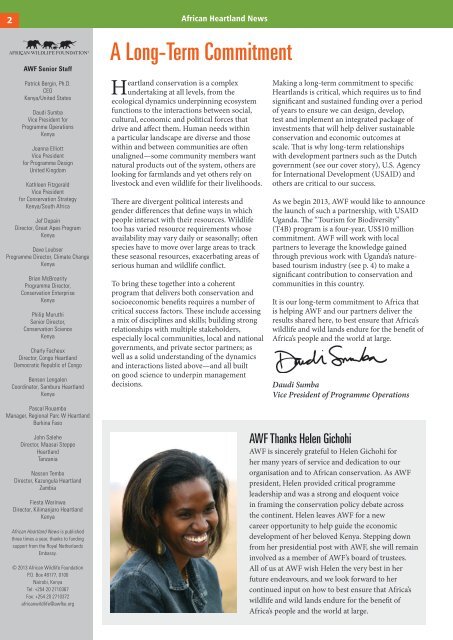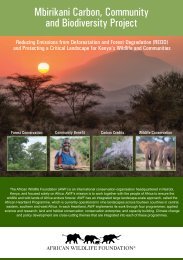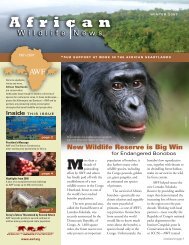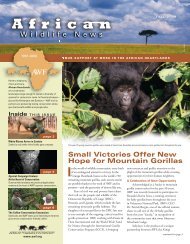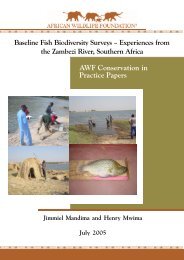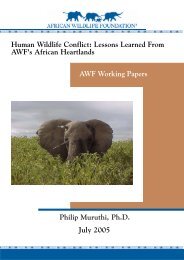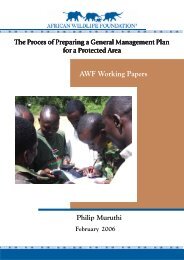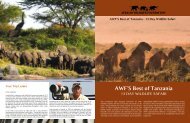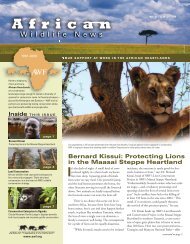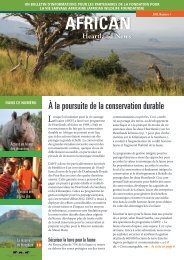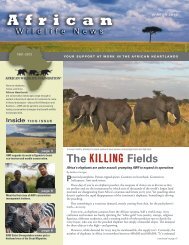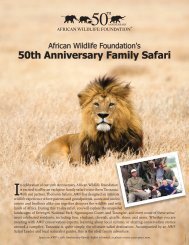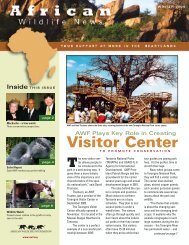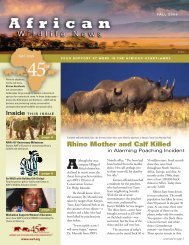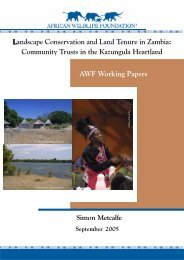Download (English) - African Wildlife Foundation
Download (English) - African Wildlife Foundation
Download (English) - African Wildlife Foundation
Create successful ePaper yourself
Turn your PDF publications into a flip-book with our unique Google optimized e-Paper software.
2<br />
2 <strong>African</strong> Heartland News<br />
<strong>African</strong> Heartland News<br />
AWF Senior Staff<br />
Patrick Bergin, Ph.D.<br />
CEO<br />
Kenya/United States<br />
Daudi Sumba<br />
Vice President for<br />
Programme Operations<br />
Kenya<br />
Joanna Elliott<br />
Vice President<br />
for Programme Design<br />
United Kingdom<br />
Kathleen Fitzgerald<br />
Vice President<br />
for Conservation Strategy<br />
Kenya/South Africa<br />
Jef Dupain<br />
Director, Great Apes Program<br />
Kenya<br />
Dave Loubser<br />
Programme Director, Climate Change<br />
Kenya<br />
Brian McBrearity<br />
Programme Director,<br />
Conservation Enterprise<br />
Kenya<br />
Philip Muruthi<br />
Senior Director,<br />
Conservation Science<br />
Kenya<br />
Charly Facheux<br />
Director, Congo Heartland<br />
Democratic Republic of Congo<br />
Benson Lengalen<br />
Coordinator, Samburu Heartland<br />
Kenya<br />
Pascal Rouamba<br />
Manager, Regional Parc W Heartland<br />
Burkina Faso<br />
John Salehe<br />
Director, Maasai Steppe<br />
Heartland<br />
Tanzania<br />
Nasson Tembo<br />
Director, Kazungula Heartland<br />
Zambia<br />
Fiesta Warinwa<br />
Director, Kilimanjaro Heartland<br />
Kenya<br />
<strong>African</strong> Heartland News is published<br />
three times a year, thanks to funding<br />
support from the Royal Netherlands<br />
Embassy.<br />
© 2013 <strong>African</strong> <strong>Wildlife</strong> <strong>Foundation</strong><br />
P.O. Box 48177, 0100<br />
Nairobi, Kenya<br />
Tel: +254 20 2710367<br />
Fax: +254 20 2710372<br />
africanwildlife@awfke.org<br />
A Long-Term Commitment<br />
Heartland conservation is a complex<br />
undertaking at all levels, from the<br />
ecological dynamics underpinning ecosystem<br />
functions to the interactions between social,<br />
cultural, economic and political forces that<br />
drive and affect them. Human needs within<br />
a particular landscape are diverse and those<br />
within and between communities are often<br />
unaligned—some community members want<br />
natural products out of the system, others are<br />
looking for farmlands and yet others rely on<br />
livestock and even wildlife for their livelihoods.<br />
There are divergent political interests and<br />
gender differences that define ways in which<br />
people interact with their resources. <strong>Wildlife</strong><br />
too has varied resource requirements whose<br />
availability may vary daily or seasonally; often<br />
species have to move over large areas to track<br />
these seasonal resources, exacerbating areas of<br />
serious human and wildlife conflict.<br />
To bring these together into a coherent<br />
program that delivers both conservation and<br />
socioeconomic benefits requires a number of<br />
critical success factors. These include accessing<br />
a mix of disciplines and skills; building strong<br />
relationships with multiple stakeholders,<br />
especially local communities, local and national<br />
governments, and private sector partners; as<br />
well as a solid understanding of the dynamics<br />
and interactions listed above—and all built<br />
on good science to underpin management<br />
decisions.<br />
Making a long-term commitment to specific<br />
Heartlands is critical, which requires us to find<br />
significant and sustained funding over a period<br />
of years to ensure we can design, develop,<br />
test and implement an integrated package of<br />
investments that will help deliver sustainable<br />
conservation and economic outcomes at<br />
scale. That is why long-term relationships<br />
with development partners such as the Dutch<br />
government (see our cover story), U.S. Agency<br />
for International Development (USAID) and<br />
others are critical to our success.<br />
As we begin 2013, AWF would like to announce<br />
the launch of such a partnership, with USAID<br />
Uganda. The “Tourism for Biodiversity”<br />
(T4B) program is a four-year, US$10 million<br />
commitment. AWF will work with local<br />
partners to leverage the knowledge gained<br />
through previous work with Uganda’s naturebased<br />
tourism industry (see p. 4) to make a<br />
significant contribution to conservation and<br />
communities in this country.<br />
It is our long-term commitment to Africa that<br />
is helping AWF and our partners deliver the<br />
results shared here, to best ensure that Africa’s<br />
wildlife and wild lands endure for the benefit of<br />
Africa’s people and the world at large.<br />
Daudi Sumba<br />
Vice President of Programme Operations<br />
AWF Thanks Helen Gichohi<br />
AWF is sincerely grateful to Helen Gichohi for<br />
her many years of service and dedication to our<br />
organisation and to <strong>African</strong> conservation. As AWF<br />
president, Helen provided critical programme<br />
leadership and was a strong and eloquent voice<br />
in framing the conservation policy debate across<br />
the continent. Helen leaves AWF for a new<br />
career opportunity to help guide the economic<br />
development of her beloved Kenya. Stepping down<br />
from her presidential post with AWF, she will remain<br />
involved as a member of AWF’s board of trustees.<br />
All of us at AWF wish Helen the very best in her<br />
future endeavours, and we look forward to her<br />
continued input on how to best ensure that Africa’s<br />
wildlife and wild lands endure for the benefit of<br />
Africa’s people and the world at large.


